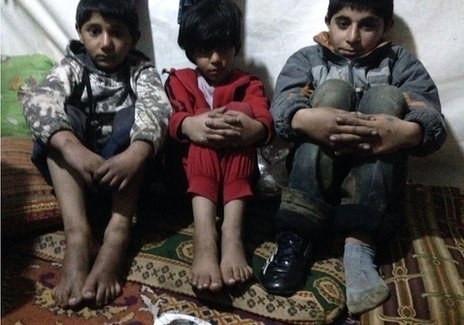While the UN officials express their concerns about the Syrian refugees in Jordan and Lebanon during the blustery snowstorm that has been dropping torrential rain and snow on Lebanon and Jordan on Wednesday, SANA news agency was celebrating the sow showing photos of children playing with it.
The storm, dubbed Alexa, pushed temperatures below freezing in northern Lebanon and some areas of the Bekaa Valley, which is dotted with informal refugee settlements. The winter weather heaped another layer of misery on the already grim existence of many of the estimated 1.4 million Syrians in Lebanon who fled the civil war raging in their homeland, the Associated Press reported.
"We are extremely concerned for the refugees this winter that promises to be very harsh," Dana Sleiman of the U.N. High Commissioner for Refugees told The Associated Press.
But the Syrian official news agency SANA published photos of children playing with the snow and reported that temperatures would be below the average by 8-11 degrees as the country is affected by a low-pressure area of polar origin accompanied by cold and moist fronts.
SANA did not say a word about the situation of diesel, the main substance used for heating in Syria, which has become extremely rare and too expensive.
Since the Syrian conflict began in March 2011, more than 2 million Syrians — at least half of them children — have fled the violence in their homeland to neighboring countries like Lebanon, Jordan, Turkey and Iraq. Many will spend the winter in flimsy tents with often only a plastic sheet covering the ground.
In Marj, a Lebanese town near the border with Syria, refugees on Wednesday were piling up extra layers of plastic bags and tarps supplied by the UNHCR in an effort to reinforce their tents, according to AP.
"I don't know if this tent will hold up, it's just a few flimsy pieces of metal holding it up," said Abu Suleiman, eying his tent with worry. Abu Suleiman, who only agreed to give his nickname because of security concerns, has lived in the settlement with about 40 other families since fleeing the Damascus suburb of Jisreen five months ago with little more than the clothes on his back.
Unlike in Turkey, Jordan and Iraq, the Lebanese government is not providing facilities or land to temporarily accommodate refugees despite the continuing influx into the country of 4.5 million. Many Syrians in Lebanon live in appalling conditions, finding shelter in slums, tents and tin shacks strung with laundry lines and wedged between farmland outside towns and cities.
At least 80,000 refugees will have to spend the winter in tents. Many others are living in unfinished or unheated buildings with only slightly more protection.
AFP quoted UNHCR spokeswomen Lisa Abou Khaled as saying, “We are worried, because it is really cold in the Bekaa region, and we're extremely worried about the refugees living in makeshift shelters, because many are really substandard."
Water has come into the tents from the roofs, and from the ground where there is flooding. At the moment there is more than 10cm (3.9in) of snow on the ground, but more is expected.
Syrian refugees in tents in the Bekaa Valley are facing the bitter cold with wooden sticks and tree branches and by burning agricultural water pipes and shoes. The harshness of their conditions varies depending on the quality and quantity of aid they receive from the United Nations High Commission for Refugees. The fortunate ones received a heater, a nylon cover and a fuel voucher for heating, while the rest are left to their own devices.
Lebanese al-Akhbar published a report on Omran’s four children who are busy picking whatever wood, logs, plastic and shoes they can find for heating fuel in preparation for the expected snowstorm. Omran complains that the UNHCR has stopped distributing financial aid, which forces them to search for inexpensive means for heating.
No donor, al-Akhbar continues, has offered diesel allowances, so they have no choice but to use blankets, since every day of heating costs 10,000 Lebanese lira (LL) ($6.63)The situation is not much better in al-Marj camp after the UNHCR scratched the names of certain displaced Syrian families from the lists of its beneficiaries. These families, like that of Umm Salim, are now in a bind: “I know it is blasphemous to say so, but the delayed rain has been a blessing.” She informs us that until this point, no donor has offered diesel allowances, so they have no choice but to use blankets, since every day of heating costs 10,000 Lebanese lira (LL) ($6.63).
Oddly, the situation of Syrian refugees whose numbers have increased exponentially in the villages of the Bekaa, is not much worse than that of native residents, in light of the terrible economic conditions and a lack of work opportunities.
Due to the competition and increased demand, Mohammed from Majdal Anjar could not collect wood and tree branches this year, whether from the surrounding woods or the sawmills.
Haitham Ali knows that he will not be able to get free wood this year, as he does every year, so he started using burned oil for his heater instead, despite the chest diseases and suffocation this can cause among children. He says: “I talked with five places that do car and truck oil changes, and in two months I collected three barrels for LL 450,000 ($300).”
Souad, who lives along the international road in Taanayel, was used to getting her daily diesel requirement. Today she complains that the price of a diesel can sometimes exceeds LL 20,000 ($13.26). “We can no longer fill five barrels as we used to do,” she laments.
......


